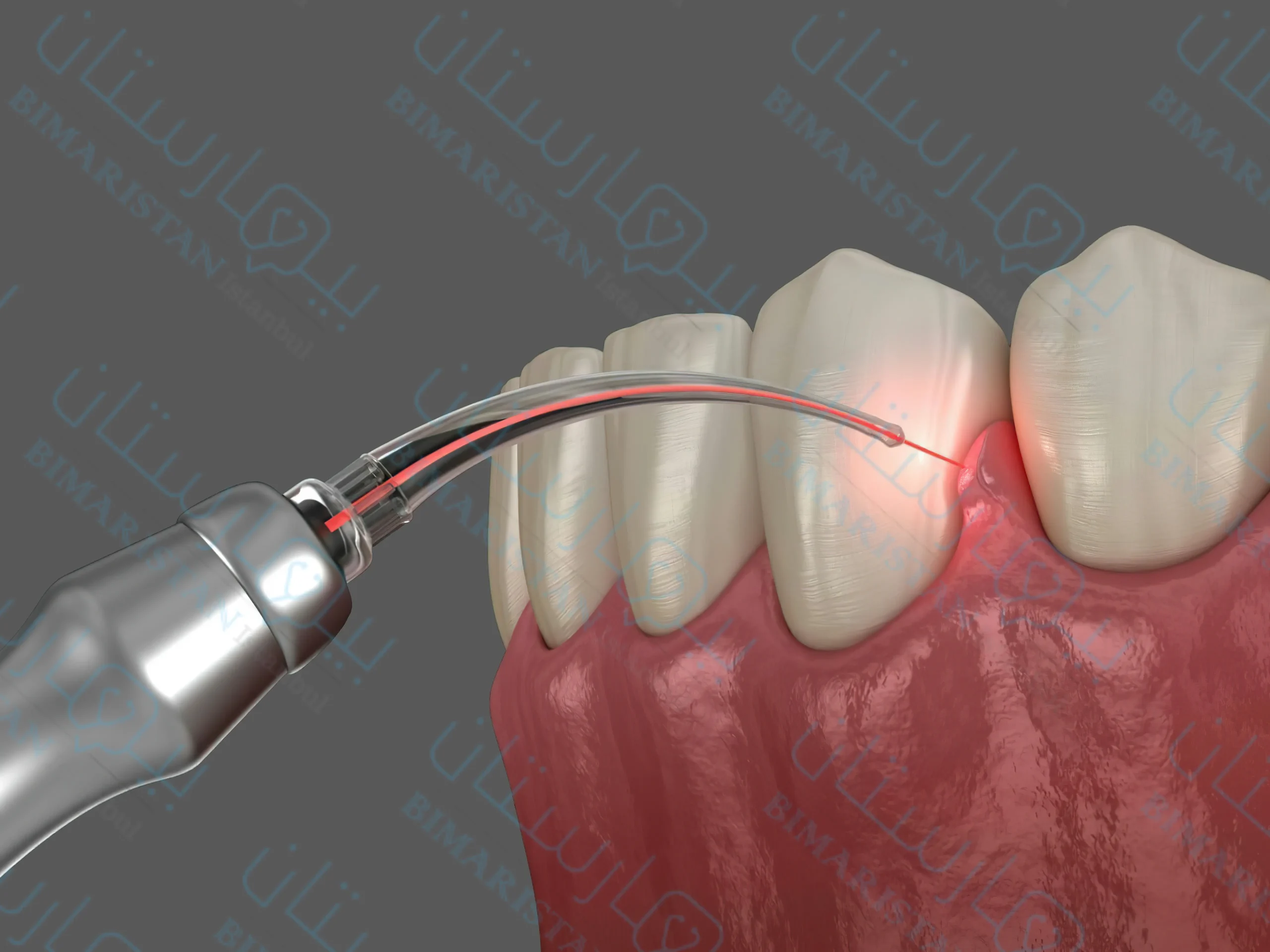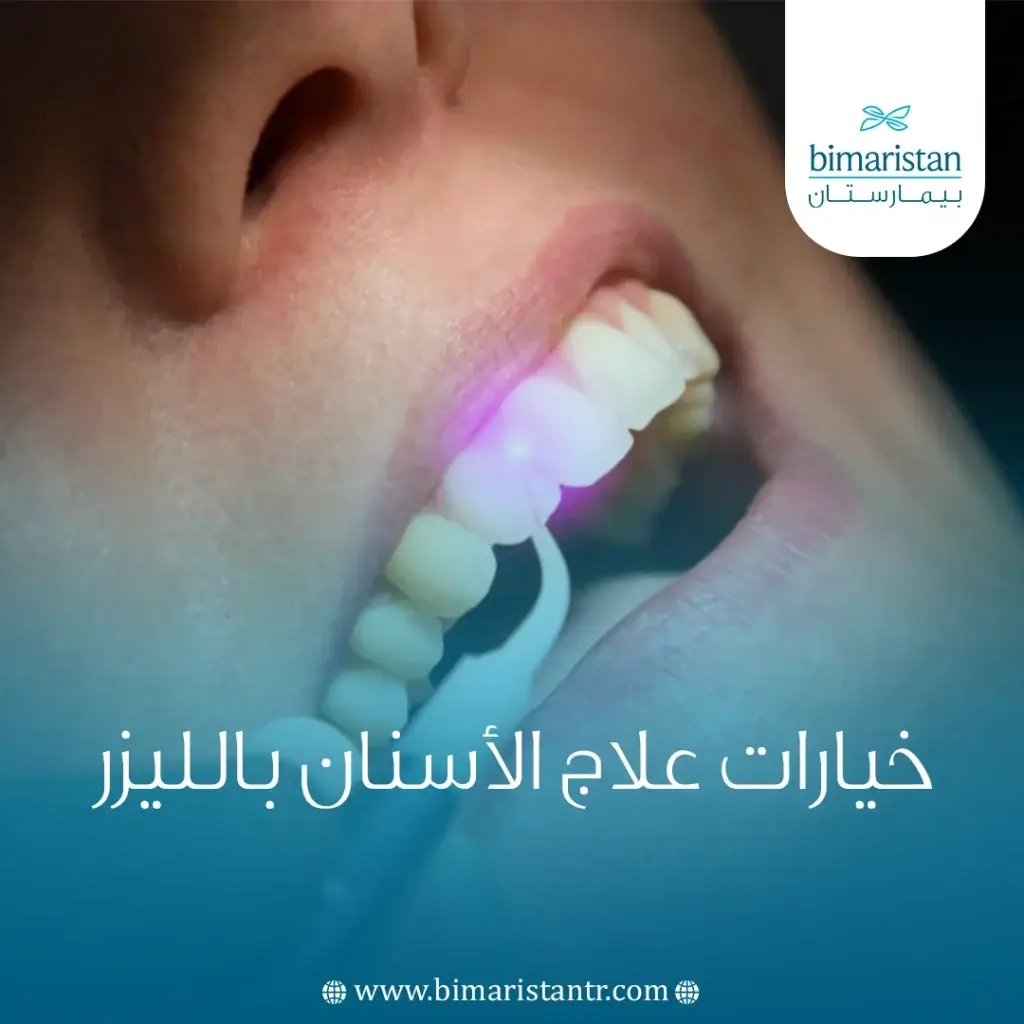علاج الأسنان بالليزر في تركيا يعد من أبرز التقنيات الحديثة التي تتناول علاج حالات مختلفة ومتنوعة في طب الأسنان باستخدام الليزر مما يجعله أكثر سهولة ودقة وراحة.
الليزر هو جهاز ينبعث منه الضوء يستخدم في الجراحة لقطع الأنسجة الصلبة والرخوة وحلها، يتم استخدام الليزر في طب الأسنان في عدد من العلاجات.
وافقت إدارة الغذاء والدواء FDA على طب الأسنان بالليزر كخيار علاجي للعديد من حالات الأسنان حيث يمكن أن يجعل الليزر علاجات الأسنان أكثر كفاءة وفعالية من حيث التكلفة وراحة.
ما هو المقصود بعلاج الأسنان بالليزر في تركيا؟
علاج الأسنان بالليزر هو تطبيق الليزر في علاج العديد من حالات الأسنان المختلفة في طب الأسنان.
توفر أشعة الليزر خياراً علاجياً أكثر راحة لعدد من إجراءات الأسنان التي تشمل الأنسجة الصلبة أو الرخوة مقارنة بأدوات الحفر والأدوات الأخرى التقليدية.
الليزر LASER يعني تضخيم الضوء من خلال انبعاث الإشعاع المحفّز، تولد الأداة طاقة ضوئية في شعاع ضيق للغاية ومركّز، ينتج ضوء الليزر هذا تفاعلاً عندما يصطدم بالأنسجة مما يسمح له بإزالة الأنسجة أو تشكيلها.

تعمل جميع أنواع الليزر من خلال توصيل الطاقة على شكل ضوء، عند استخدامه في الليزر في علاج الأسنان والعمليات الجراحية يعمل الليزر كأداة قطع أو مبخر للأنسجة التي يتلامس معها، وعند استخدامه في إجراءات تبييض الأسنان يعمل الليزر كمصدر حرارة يعزز تأثير عوامل تبييض الأسنان.
ما هي أنواع الليزر في طب الأسنان المستخدمة؟
يستخدم أخصائيو طب الأسنان تقنيات علاج الأسنان بالليزر إما على الأنسجة الصلبة أو الأنسجة الرخوة بحسب الإجراء المطلوب، تشير الأنسجة الصلبة إلى الأسنان والعظام وتشير الأنسجة الرخوة إلى اللثة.
ليزر الأنسجة الصلبة
يتميز ليزر الأنسجة الصلبة بقدرته على قطع البنى الصلبة كالأسنان، حيث يتم امتصاص أطوالها الموجية عبر مزيج من الماء والمعدن الموجود في الأسنان، يستخدم هذا الليزر غالباً لتحضير الأسنان و تشكيلها أو إصلاح حشوات الأسنان التي تآكلت ولإزالة البعض من بنية الأسنان.
تشمل إجراءات الأنسجة الصلبة الشائعة ما يلي:
كشف النخور
يمكن أن يساعد الليزر في الكشف المبكر عن التسوس والتحري عن مناطق النخر.
علاج تسوس الأسنان الأمامية والخلفية بالليزر
يتم استخدام الليزر لإزالة التسوس داخل السن وتجهيز الميناء المحيط لاستلام الترميم (الحشو) كما يمكن ازالة التسوس بالليزر في الحالات الخفيفة.
تحضير وحشو الاسنان بدون تخدير وبدون ألم
غالباً لا تكون هناك حاجة إلى التخدير الموضعي مع العلاج بالليزر، كما يمكن أن يقتل الليزر البكتيريا الموجودة في التجويف النخري مما يساعد في الحفاظ على صحة الأسنان على المدى الطويل.
علاج حساسية الأسنان بالليزر
يمكن معالجة الأسنان التي لديها حساسية من الحرارة والبرودة باستخدام ليزر الأسنان عن طريق غلق القنوات العاجية في السن مما يمنع انتقال الحساسية والألم إلى العصب.
ليزر الأنسجة الرخوة
يتم امتصاص ليزر الأنسجة الرخوة من خلال الماء والهيموغلوبين الموجودين في اللثة، الهيموغلوبين هو بروتين موجود في خلايا الدم الحمراء، تستخدم هذه الليزرات في علاج التهاب دواعم السن بما في ذلك قتل البكتيريا وتنشيط إعادة نمو الأنسجة.
يعمل ليزر الأنسجة الرخوة على سد النهايات العصبية والأوعية الدموية أثناء اختراقه للأنسجة لهذا السبب لا يعاني المريض من الألم تقريباً بعد العلاج بالليزر كما يعمل الليزر أيضاً على تعزيز التئام وشفاء الأنسجة بشكل أسرع.
تشمل استخدامات ليزر الأنسجة الرخوة الشائعة ما يلي:
علاج الابتسامة اللثوية في تركيا
الليزر اليوم أصبح يستخدم لإعادة تشكيل نسيج اللثة المسبب لـ الابتسامة اللثوية التي تتميز بكون اللثة تغطي جزءاً كبيراً من السن مما يؤثر على جمالية الإبتسامة.

تطويل تاج السن
يقوم هذا الإجراء بإطالة تيجان الأسنان عن طريق إعادة تشكيل أنسجة اللثة والعظام للحصول على بنية أسنان أكثر صحة مما يساعد في وضع الترميمات بشكل ملائم على الأسنان.
جراحة قطع لجام اللسان
اللجام هو ثنية من الجلد تقع تحت الجزء الأمامي من اللسان والتي تثبته بقاع الفم، قد يستفيد الأشخاص ذوو اللجام السميك أو المشدود من استئصال اللجام بالليزر يساعد هذا العلاج الأطفال الذين يتسبب لجامهم في تقييد اللسان وصعوبة الرضاعة الطبيعية وإعاقة النطق.
إزالة طيات الأنسجة الرخوة
يمكن أن يزيل الليزر طيات الأنسجة الرخوة ميمكن أن يزيل الليزر طيات الأنسجة الرخوة التي حدثت بسبب استخدام أطقم الأسنان غير المناسبة دون ألم أو خيوط جراحية.
أمراض اللثة
يستخدم الليزر إعادة تشكيل اللثة وإزالة البكتيريا ضمن الجذر في العديد من الحالات مثل أثناء إجراءات علاج قناة الجذر.
إجراءات الليزر الأخرى
مشاهدة النسج حول السنية
تسمح بعض أنواع الليزر للطبيب بإبعاد اللثة ورؤية أنسجة الأسنان أو اللثة بأمان.
أخذ خزعة أو إزالة الآفة
يمكن استعمال الليزر لإزالة قطعة صغيرة من الأنسجة تسمى الخزعة بحيث يمكن فحصها نسيجياً في حال الاشتباه بالسرطان، كما يستخدم الليزر لإزالة الآفات في الفم وتخفيف آلام القروح حيث يمكن لليزر إزالة الأورام من سقف الحلق واللثة وجوانب الشفاه والخدود بطريقة خالية من الألم والخيوط.
علاج انقطاع النفس الانسدادي النومي
يمكن لليزر إعادة تشكيل الحلق وتخفيف مشاكل التنفس المصاحبة عندما يكون انقطاع النفس النومي ناجماً عن فرط نمو الأنسجة في الحلق.
علاج المفصل الصدغي الفكي
يمكن أن يساعد الليزر في تقليل الألم والالتهاب في المفصل الفكي الصدغي.
تجديد العصب
يمكن أن يساعد الليزر في تجديد الأوعية الدموية والأعصاب والندوب التالفة.
معالجة قروح البرد
يمكن أن يقلل الليزر من وقت الشفاء ويقلل من الألم الناتج عن قرح البرد.
تبييض الأسنان بالليزر
يستخدم الليزر لتسريع إجراءات تبييض الأسنان في العيادة حيث يتم تنشيط محلول البيروكسيد المستخدم للتبييض والمطبق على سطح الأسنان بواسطة طاقة الليزر مما يسرع عملية التبييض.
يمكن أن تختلف علاجات الليزر مثل هذه في السعر اعتماداً على الإجراء الذي يتم إجراؤه ومعدات الليزر المستخدمة.
إيجابيات علاج الأسنان بالليزر على الطرق الأخرى
بالمقارنة مع مثقاب الأسنان التقليدي فإن تطبيقات علاج الأسنان بالليزر لها عدة فوائد:
- وداعاً لتخدير الأسنان، حيث تسبب ألماً أقل في بعض الحالات لذلك تقلل الحاجة إلى التخدير.
- تقلل القلق عند المرضى غير المستريحين لاستخدام مثقاب الأسنان.
- تقليل النزيف والتورم أثناء علاجات الأنسجة الرخوة حيث يعزز الليزر تخثر الدم.
- أقل حاجة للخيوط الجراحية باستخدام ليزر الأنسجة الرخوة.
- تحافظ على أسنان أكثر صحة أثناء إزالة تجويف النخر.
- فرصة الإصابة بالعدوى البكتيرية أقل لأن الليزر يعقم المنطقة.
- يمكن أن تلتئم الجروح بشكل أسرع ومن الممكن أن تتجدد الأنسجة.
- قد تنطوي الإجراءات على ضرر أقل للأنسجة المحيطة.

سلبيات علاج الأسنان بالليزر
عيوب استخدام الليزر في علاج الأسنان بالليزر هي:
- لا يمكن استخدام الليزر على الأسنان ذات أنواع معينة من الحشوات الموجودة مثل الأملغم المعدني.
- لا يمكن استخدام الليزر في العديد من إجراءات طب الأسنان الشائعة على سبيل المثال لا يمكن استخدام الليزر في حال النخور الموجودة بين الأسنان وحول الحشوات القديمة والنخور الكبيرة التي يجب فيها تحضير السن للتاج.
- بالإضافة إلى ذلك لا يمكن استخدام الليزر لإزالة التيجان المعيبة أو الحشوات الفضية أو تجهيز الأسنان للجسور.
- قد تظل هناك حاجة إلى المثاقب التقليدية لتشكيل الحشوة وضبط الإطباق وتلميع الحشوة حتى عند استخدام الليزر.
- لا يلغي الليزر الحاجة إلى التخدير فبعض إجراءات الليزر تتطلب التخدير.
- يمكن أن يؤدي الليزر الصلب في بعض الأحيان إلى إصابة لب الأسنان.
- هناك خطر إصابة اللثة.
- هناك حاجة أحياناً إلى التدريب لإنهاء الحشوات بما في ذلك تشكيل الحشوة وتعديلها وتلميعها.
- تميل المعالجة بالليزر إلى أن تكون باهظة الثمن فتكلفة الليزر أعلى بكثير من تكلفة حفر الأسنان.
ما هي المخاطر المصاحبة لعلاج الأسنان بالليزر؟
لقد سبق ووافقت إدارة الغذاء والدواء FDA على علاج الأسنان بالليزر للتعامل مع مشاكل الأسنان، ولكن لم تقدم الجمعية الأمريكية لطب الأسنان ADA الضوء الأخضر بعد.
مخاطر علاج الأسنان بالليزر صغيرة نسبياً، من المهم العثور على أخصائي أسنان مؤهل لأن استخدام الطول الموجي الخاطئ لليزر قد يؤدي إلى تلف الأنسجة حيث تتطلب علاجات الليزر تدريباً يتم تقديمه من قبل الشركات المصنعة ومؤسسات طب الأسنان والمنظمات المهنية.
كما سيطلب منك طبيب أسنانك استخدام نظارات خاصة لحماية عينيك من الليزر.
إذا كنت تفكر في الحصول على علاج بالليزر لحالة أسنانك أو لديك المزيد من الأسئلة حول هذا النوع الجديد من العلاج يمكنك التواصل معنا نحن مركز بيمارستان.
المصادر
